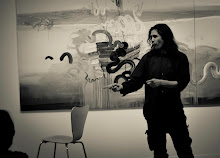One of the odd, almost covert secrets to what we call thinking, is its relationship with what we write, and how we write it. To solve an equation in one's head is rather difficult, but to have it all written down, and in the right way, is to have it solved. The moment something is out there, the moment it is external, it changes in how we react to it. We see it as something external to us, and can correct it or even react to it as something other than ourselves. To write a thing, is to lose one's own unique right to it. Writing marks the moment the thought stops being simply one's own, and becomes everyone's (oneself included).
And yet, as anyone solving an equation or writing down an idea knows, it is not quite that simple. To write it down is to objectify it, and so be able to check it. And yet as one writes an idea down, as they become anyone's thought, they also remain one's own thinking. Hence one enters into a strange kind of dialogue, between one's 'thoughts that everyone' might read, and as they exist in one's own mind. To write a book is to think as oneself, but also as everyone or anyone, and so to be placed in the strange territory that oscillates between the two.
This process is very much the stuff of philosophy books, which are written as much for the thinker and their own mental process, as for any reader. They are often then both strangely intimate - as they record a mind exploring itself and its ideas; and yet also oddly impersonal - as what is left of that exploration is only the everyman part. Hence they exist as an enigma, as half of a thought process. What is more, a reader of such a work, is actually being invited to complete this whole and use the book as an 'anyone' to negotiate their own thoughts, and so to set up their own internal dialogues, and think for themselves.
The role of performance philosophy as I understand it, is to reflect upon, and catch something of these strange dialogues. One is therefore exploring not the personality of the writer (one is an actor, and never trying to 'get under the skin' of the thinker as themselves) so much as how the 'everyone' of a philosophy book loops both back into the initial writer, and forwards into us all. One is essentially exploring the 'double loop' by which a book binds together its writer and its readers in different mental journeys of their own. This is of course why the history of the text, both in the context of the thinker's own mental development, but also in the sense of wider posterity, matters so much. It is this history that shows, in part at least, the way in which the book changed things, both for its writer but also for us, and even more importantly how it still changes things. However even this history is only a part of the picture, and as such serves as its inspiration or clue. The real power of performance philosophy stands and falls, by how it illustrates or explores or opens out, or perhaps even inverts, the intense relationship between writer, book and reader. A performance works only if this relationship is rendered both palpable, powerful, and present. That is, it works when the book is made vivid, and given its own power to reach across the years, splicing our minds to the original thinker's ideas, and so inciting us to go on a mental journey own. I feeling, a power, I at least strive for in every performance.


No comments:
Post a Comment